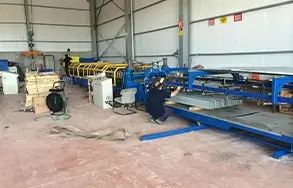Affordable Roof Tile Roll Forming Machines for High-Quality Roofing Solutions in Your Budget
Understanding the Price Factors of Roof Tile Roll Forming Machines
Roof tile roll forming machines are essential in the construction industry, designed to produce beautiful and durable roof tiles efficiently. These machines are crucial for manufacturers who want to meet the growing demand for roofing materials. However, one of the most common queries among potential buyers is the price of roof tile roll forming machines. Understanding the factors that influence the pricing of these machines can aid in making an informed purchasing decision.
1. Machine Specifications
The price of a roof tile roll forming machine largely depends on its specifications. Basic models may be available at a lower cost, but they could lack advanced features such as automated controls, multiple tile designs, or higher production speeds. Machines that can produce a wider variety of tile profiles or that come equipped with programmable features tend to be more expensive. Therefore, when assessing prices, it is crucial to consider the machine’s capabilities and your specific production needs.
2. Material Quality and Durability
The quality of materials used in manufacturing the roll forming machine significantly affects its price. High-quality steel frames, durable components, and reliable electronic parts lead to a higher initial expenditure but can offer better durability and lower maintenance costs. Investing in a robust machine may mitigate future costs and production downtime, making it a wise choice in the long run.
Different roof tile roll forming machines have variable production capacities. Machines designed for high-volume outputs typically come at a premium price due to the additional engineering required to handle larger loads and maintain efficiency. If your business anticipates a high demand for roof tiles, investing in a machine that offers significant production capacity could enhance your profitability.
roof tile roll forming machine price

4. Customization Options
Another factor that impacts the price is the level of customization available. Some manufacturers offer bespoke machines tailored to specific production processes or unique tile designs. Customized machines often come with a higher price tag due to the additional engineering and design work. However, such machines can give producers a competitive edge, allowing them to cater to niche markets that may be emerging.
5. Technology and Automation
The integration of advanced technology and automation capabilities within roof tile roll forming machines is increasingly popular. Machines equipped with state-of-the-art technology, such as computerized controls and automated feeding systems, will usually carry a higher price. However, these technologies can lead to increased operational efficiency, reduced labor costs, and improved product consistency, making them a worthwhile investment for many manufacturers.
6. Brand and Manufacturer Reputation
The brand and reputation of the manufacturer also play a crucial role in determining the price of roof tile roll forming machines. Established brands that have built a reputation for reliability and quality often command higher prices due to perceived value and trustworthiness. On the other hand, new entrants or lesser-known brands may offer lower prices but could come with risks regarding quality and after-sales support.
Conclusion
In conclusion, the price of roof tile roll forming machines is influenced by various factors, including specifications, material quality, production capacity, customization options, technology integration, and manufacturer reputation. For businesses considering the purchase of such machines, it is essential to analyze these factors carefully in relation to their specific needs and budget. By doing so, manufacturers can ensure they invest in machinery that not only meets their expectations but also contributes significantly to their production efficiency and profitability in the competitive roofing market.
-
Top Metal Roofing Machine ManufacturersNewsAug.04, 2025
-
Production Line with a Gutter Forming Machine for SaleNewsAug.04, 2025
-
Production Capacity with a Purlin Machine for SaleNewsAug.04, 2025
-
Exploring Roofing Sheets Manufacturing Machine PriceNewsAug.04, 2025
-
Drywall Roll Forming Machine for SaleNewsAug.04, 2025
-
Best Roof Panel Machine for SaleNewsAug.04, 2025
-
Roof Panel Machines: Buying Guide, Types, and PricingNewsJul.04, 2025








